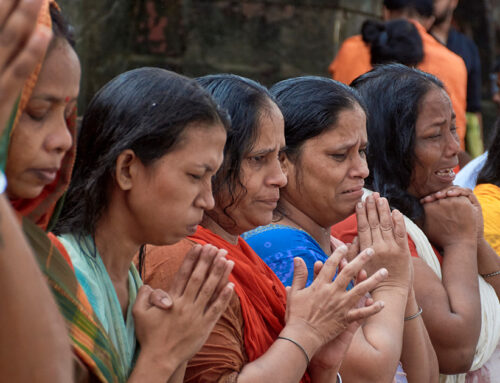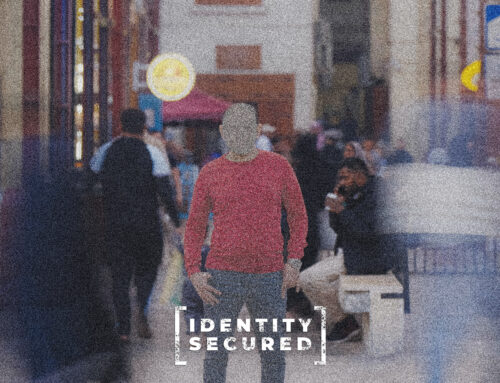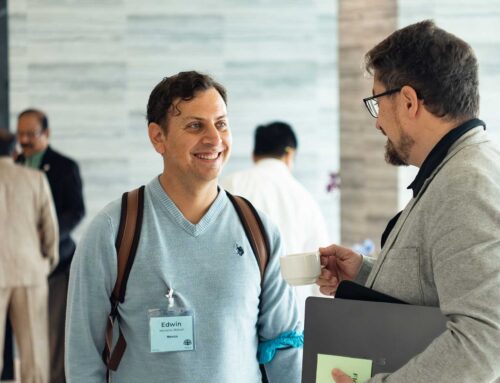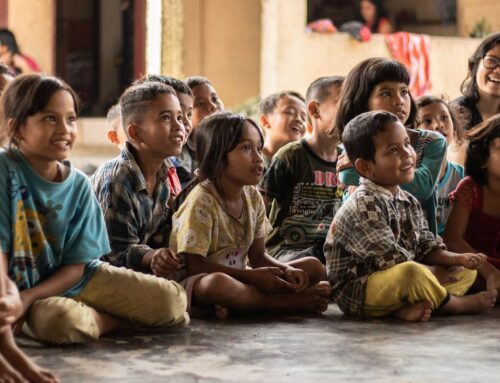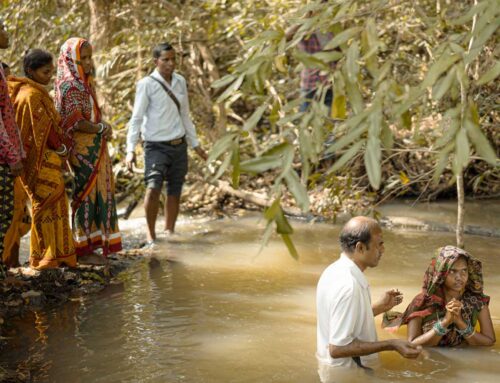Thought Leadership: The Power of Collaboration
Why local-led, diverse partnerships are the way forward for world mission.
In the late 1970s, world-renowned missiologist Paul Hiebert claimed that Haggai was “the only postcolonial model we have today for world evangelism.” We could spend all day unpacking the word “postcolonial,” but Hiebert’s basic point was that Haggai represented a shift from a top-down, Western dominated model of mission to a decentralized one driven by non-Western leaders and the needs of their local contexts. In the decades after Hiebert made the claim, many other organizations adopted methods that effectively empower indigenous Christian leaders.
Just before his passing in 2007, Hiebert told Haggai leadership that the great need of the day in the global body of Christ was no longer simply decentralization but non-hierarchical collaboration in God’s mission. Not mission from the West to the rest, nor each Christian and culture on their own island. The unique — perhaps unprecedented — opportunity for Haggai was to cultivate collaboration where Christians of different cultures, denominations, and vocations brought their distinct gifts and perspectives together to deepen and expand our participation in God’s work.
Christianity in the 21st century is the most culturally diverse religious community in world history, and Haggai has played a role in this development. However, this diversity has also led to division. The growth of new churches can be the fruit of God’s work, but sometimes they are a product of isolated and individualistic efforts to promote a new brand of Christianity rather than joining a united effort to promote the Gospel of the Kingdom. A spirit of competition, not collaboration, can dominate Christian movements today. Christianity’s diversity, however, can be a force for change as it promotes a spirit of collaboration and partnership. In a recent piece on the United Nations, “From Nudging Individuals to Stewarding Collectives,” the Brookings Institute highlights the shift toward harnessing the power of “collectives” to promote transformation in global development. Christians participating in God’s mission have long practiced community mobilization models as the local church promoting holistic transformation. In the Sahel region of Africa, the Oasis Network — a pioneering Bible translation organization — harnesses community organizing principles through local, indigenous churches to promote Bible translation and grassroots social transformation. A similar pattern is happening through our pilot initiative in Mongolia. Diverse leaders with diverse areas of expertise are uniting around the promotion of holistic Gospel flourishing where Christ isn’t known. The body of Christ is the most untapped locally rooted global network in the world. Division, isolation, and individualism are its enemies. Collaboration, presence, and partnership in the Spirit are its power.
Collaboration in God’s mission is not only effective, but biblical. Paul says in Romans that we are “members of one another” (Romans 12:5 NKJV). Relationship and reconciliation — with God and neighbor — are the means and goal of God’s mission (2 Corinthians 5:16-21). In her book, “Faithful Friendships: Embracing Diversity in Christian Community,” missions scholar Dana Robert displays the power of boundary-crossing friendship in the history of God’s global work. She writes that Christian love bridging across differences bears witness to the God of others-centered love. So, it makes perfect theological sense that collaboration is a powerful force in our Kingdom work and draws us deeper into the reality of who God is and who He has made us to become.
We are working this spirit of collaboration into our thought leadership initiatives. One of our primary goals is to surface and bring together the local wisdom of our Haggai leaders around the world, allowing their creative insights and growing relationships to keep us on the leading edge of God’s mission. We want to continue being a force for collaboration, not division, in our increasingly fragmented world. From start to finish, in Mongolia and beyond, we are better together.
Written by Dr. Tyler Lenocker, V.P. of Global Research
References: Dana L. Robert, “Faithful Friendships: Embracing Diversity
in Christian Community. W.B.” Eerdmans Publishing, 2019. • Jacob Taylor, “From Nudging Individuals to Stewarding Collectives: How to Boost Collaboration for the SDGs.” https://www.brookings.edu/articles/ from-nudging-individuals-to-stewarding-collectives-how-collectivebehavior-research-can-boost-collaboration-for-the-sdgs/.
Thought Leadership: The Power of Collaboration
Why local-led, diverse partnerships are the way forward for world mission.
In the late 1970s, world-renowned missiologist Paul Hiebert claimed that Haggai was “the only postcolonial model we have today for world evangelism.” We could spend all day unpacking the word “postcolonial,” but Hiebert’s basic point was that Haggai represented a shift from a top-down, Western dominated model of mission to a decentralized one driven by non-Western leaders and the needs of their local contexts. In the decades after Hiebert made the claim, many other organizations adopted methods that effectively empower indigenous Christian leaders.
Just before his passing in 2007, Hiebert told Haggai leadership that the great need of the day in the global body of Christ was no longer simply decentralization but non-hierarchical collaboration in God’s mission. Not mission from the West to the rest, nor each Christian and culture on their own island. The unique — perhaps unprecedented — opportunity for Haggai was to cultivate collaboration where Christians of different cultures, denominations, and vocations brought their distinct gifts and perspectives together to deepen and expand our participation in God’s work.
Christianity in the 21st century is the most culturally diverse religious community in world history, and Haggai has played a role in this development. However, this diversity has also led to division. The growth of new churches can be the fruit of God’s work, but sometimes they are a product of isolated and individualistic efforts to promote a new brand of Christianity rather than joining a united effort to promote the Gospel of the Kingdom. A spirit of competition, not collaboration, can dominate Christian movements today. Christianity’s diversity, however, can be a force for change as it promotes a spirit of collaboration and partnership. In a recent piece on the United Nations, “From Nudging Individuals to Stewarding Collectives,” the Brookings Institute highlights the shift toward harnessing the power of “collectives” to promote transformation in global development. Christians participating in God’s mission have long practiced community mobilization models as the local church promoting holistic transformation. In the Sahel region of Africa, the Oasis Network — a pioneering Bible translation organization — harnesses community organizing principles through local, indigenous churches to promote Bible translation and grassroots social transformation. A similar pattern is happening through our pilot initiative in Mongolia. Diverse leaders with diverse areas of expertise are uniting around the promotion of holistic Gospel flourishing where Christ isn’t known. The body of Christ is the most untapped locally rooted global network in the world. Division, isolation, and individualism are its enemies. Collaboration, presence, and partnership in the Spirit are its power.
Collaboration in God’s mission is not only effective, but biblical. Paul says in Romans that we are “members of one another” (Romans 12:5 NKJV). Relationship and reconciliation — with God and neighbor — are the means and goal of God’s mission (2 Corinthians 5:16-21). In her book, “Faithful Friendships: Embracing Diversity in Christian Community,” missions scholar Dana Robert displays the power of boundary-crossing friendship in the history of God’s global work. She writes that Christian love bridging across differences bears witness to the God of others-centered love. So, it makes perfect theological sense that collaboration is a powerful force in our Kingdom work and draws us deeper into the reality of who God is and who He has made us to become.
We are working this spirit of collaboration into our thought leadership initiatives. One of our primary goals is to surface and bring together the local wisdom of our Haggai leaders around the world, allowing their creative insights and growing relationships to keep us on the leading edge of God’s mission. We want to continue being a force for collaboration, not division, in our increasingly fragmented world. From start to finish, in Mongolia and beyond, we are better together.
Written by Dr. Tyler Lenocker, V.P. of Global Research
References: Dana L. Robert, “Faithful Friendships: Embracing Diversity
in Christian Community. W.B.” Eerdmans Publishing, 2019. • Jacob Taylor, “From Nudging Individuals to Stewarding Collectives: How to Boost Collaboration for the SDGs.” https://www.brookings.edu/articles/ from-nudging-individuals-to-stewarding-collectives-how-collectivebehavior-research-can-boost-collaboration-for-the-sdgs/.
Thought Leadership: The Power of Collaboration
Why local-led, diverse partnerships are the way forward for world mission.
In the late 1970s, world-renowned missiologist Paul Hiebert claimed that Haggai was “the only postcolonial model we have today for world evangelism.” We could spend all day unpacking the word “postcolonial,” but Hiebert’s basic point was that Haggai represented a shift from a top-down, Western dominated model of mission to a decentralized one driven by non-Western leaders and the needs of their local contexts. In the decades after Hiebert made the claim, many other organizations adopted methods that effectively empower indigenous Christian leaders.
Just before his passing in 2007, Hiebert told Haggai leadership that the great need of the day in the global body of Christ was no longer simply decentralization but non-hierarchical collaboration in God’s mission. Not mission from the West to the rest, nor each Christian and culture on their own island. The unique — perhaps unprecedented — opportunity for Haggai was to cultivate collaboration where Christians of different cultures, denominations, and vocations brought their distinct gifts and perspectives together to deepen and expand our participation in God’s work.
Christianity in the 21st century is the most culturally diverse religious community in world history, and Haggai has played a role in this development. However, this diversity has also led to division. The growth of new churches can be the fruit of God’s work, but sometimes they are a product of isolated and individualistic efforts to promote a new brand of Christianity rather than joining a united effort to promote the Gospel of the Kingdom. A spirit of competition, not collaboration, can dominate Christian movements today. Christianity’s diversity, however, can be a force for change as it promotes a spirit of collaboration and partnership. In a recent piece on the United Nations, “From Nudging Individuals to Stewarding Collectives,” the Brookings Institute highlights the shift toward harnessing the power of “collectives” to promote transformation in global development. Christians participating in God’s mission have long practiced community mobilization models as the local church promoting holistic transformation. In the Sahel region of Africa, the Oasis Network — a pioneering Bible translation organization — harnesses community organizing principles through local, indigenous churches to promote Bible translation and grassroots social transformation. A similar pattern is happening through our pilot initiative in Mongolia. Diverse leaders with diverse areas of expertise are uniting around the promotion of holistic Gospel flourishing where Christ isn’t known. The body of Christ is the most untapped locally rooted global network in the world. Division, isolation, and individualism are its enemies. Collaboration, presence, and partnership in the Spirit are its power.
Collaboration in God’s mission is not only effective, but biblical. Paul says in Romans that we are “members of one another” (Romans 12:5 NKJV). Relationship and reconciliation — with God and neighbor — are the means and goal of God’s mission (2 Corinthians 5:16-21). In her book, “Faithful Friendships: Embracing Diversity in Christian Community,” missions scholar Dana Robert displays the power of boundary-crossing friendship in the history of God’s global work. She writes that Christian love bridging across differences bears witness to the God of others-centered love. So, it makes perfect theological sense that collaboration is a powerful force in our Kingdom work and draws us deeper into the reality of who God is and who He has made us to become.
We are working this spirit of collaboration into our thought leadership initiatives. One of our primary goals is to surface and bring together the local wisdom of our Haggai leaders around the world, allowing their creative insights and growing relationships to keep us on the leading edge of God’s mission. We want to continue being a force for collaboration, not division, in our increasingly fragmented world. From start to finish, in Mongolia and beyond, we are better together.
Written by Dr. Tyler Lenocker, V.P. of Global Research
References: Dana L. Robert, “Faithful Friendships: Embracing Diversity
in Christian Community. W.B.” Eerdmans Publishing, 2019. • Jacob Taylor, “From Nudging Individuals to Stewarding Collectives: How to Boost Collaboration for the SDGs.” https://www.brookings.edu/articles/ from-nudging-individuals-to-stewarding-collectives-how-collectivebehavior-research-can-boost-collaboration-for-the-sdgs/.


